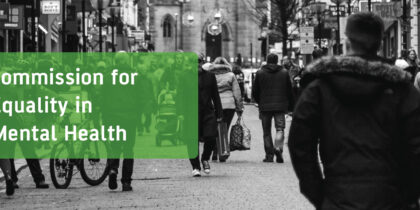This week, the Government has been setting out its plans for what will happen after the current, second lockdown in England expires. While most attention has gone to the plans to return to a tiered system of restrictions and what will happen with Test and Trace and the vaccination programme, the Department of Health and Social Care yesterday also published its plans to support mental wellbeing over the winter.
The document, Staying mentally well this winter, is mostly a restatement of plans and activities already in place with some significant new additions. It covers several different topics, including steps being taken to protect mental health at a whole population level as well as measures to support people living with mental health difficulties, and work to protect the mental health of health and care workers in the coming weeks and months.
The document begins with a focus on resources designed “to empower individuals to look after their own mental wellbeing during this time”: for example the Every Mind Matters materials published by Public Health England and resources provided to schools, colleges and universities to help them to support students’ wellbeing. These are important steps that can help to prevent the serious psychological distress many people are experiencing from developing into longer term mental health problems.
income protection schemes such as furlough and changes to the benefits system may in the long run turn out to have been the most important mental health interventions of the entire pandemic
The document acknowledges that financial pressures are a major threat to mental health. This is strongly reflected in the evidence we have reviewed in recent months – income protection schemes such as furlough and changes to the benefits system (for example, ending face-to-face disability assessments) may in the long run turn out to have been the most important mental health interventions of the entire pandemic. It is nonetheless worrying that the easing of benefit conditions and sanctions from the first national lockdown is not being continued this winter, despite the harm that these can do to people’s mental health.
The document also acknowledges the many challenges that people living with mental health difficulties have faced this year. It sets out plans to ensure people can be discharged safely from hospital and to increase the uptake of health checks and flu vaccinations among people living with a severe mental illness who are also eligible for this (for example because of their age or physical health conditions). This is a welcome move: while it falls short of offering everyone living with a severe mental illness a free flu jab, it should at least ensure that more people get what they’re entitled to.
Little or no recognition is given to the disproportionate impact of the pandemic on racialised communities and the mental health impacts of this injustice, for example
There are some significant gaps in the plan. Little or no recognition is given to the disproportionate impact of the pandemic on racialised communities and the mental health impacts of this injustice, for example. There is no specific response to the needs of people whose mental health has been affected by bereavement and loss during the pandemic: though a welcome investment in mental as well as physical health care for people living with Long Covid. And the funding available for mental health support is still a fraction of what has been provided in other areas: in schools for instance, the £8 million wellbeing programme is a tiny proportion of what the £650 million academic catch-up scheme is funded to provide.
A lot has been said of late about the mental health impacts of various policy decisions. Yet action to protect mental health nationwide and to support people with mental health difficulties has often been bolted onto other policies late on. With the Spending Review due tomorrow, reversing that approach and putting mental health at the heart of government spending and strategy would help to inform decision-making in a way that benefits all of us, and those facing the biggest inequalities especially.
Check out our key proposals for improving mental health through the Spending Review







